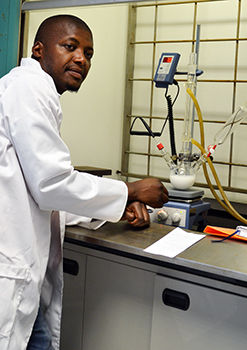
Dr Koao is making a much-needed contribution in improving lives of ordinary people through his research on lithium-ion batteries. |
The future of relevant and top-notch scientific research at the Qwaqwa Campus is in good hands. Dr Lehlohonolo Koao is one of the five members of the Vice-Chancellor’s Prestige Scholars Programme (PSP) on the Qwaqwa Campus.
The need to improve the efficiency of heating mechanisms in his immediate community in Qwaqwa, and the support he receives from the PSP, have become catalysts for his current research project on lithium-ion batteries. According to Dr Koao, the study will focus on producing batteries that last longer, store more energy, are cheaper to manufacture, and are environmentally friendly when being disposed of. These are key factors in solar energy.
‘’The majority of households in my neighbourhood have benefited from the government’s project of providing households with solar panels to help with lighting, cooking, and heating without worrying about the ever-increasing electricity costs,’’ said Dr Koao.
‘’Since my arrival in the area, I have realized that the heat absorption rate of the batteries used by solar panels is not enough. As a result, these batteries also lack enough power to sustain the supply throughout the day, especially on a cloudy day,’’ he said.
His research project focuses on improving the efficiency of lithium-ion batteries that are now commonly used in portable electronics, such as cell phones and laptops. This kind of battery is rapidly replacing the usual lead-acid batteries. Dr Koao’s determination to contribute towards a safer and more efficient heating absorption system has made him move away completely from his PhD study on lighting material.
‘’My previous study was on reducing the power usage on domestic and industrial lights as they use more electricity. This study, on the other hand, will enhance power retention in the batteries for improved daily life since cell phones, solar panels, and laptops, to mention only a few, are now a way of life,’’ he added.
Dr Koao is a Senior Lecturer in the Department of Physics, where he specializes in solid state materials.